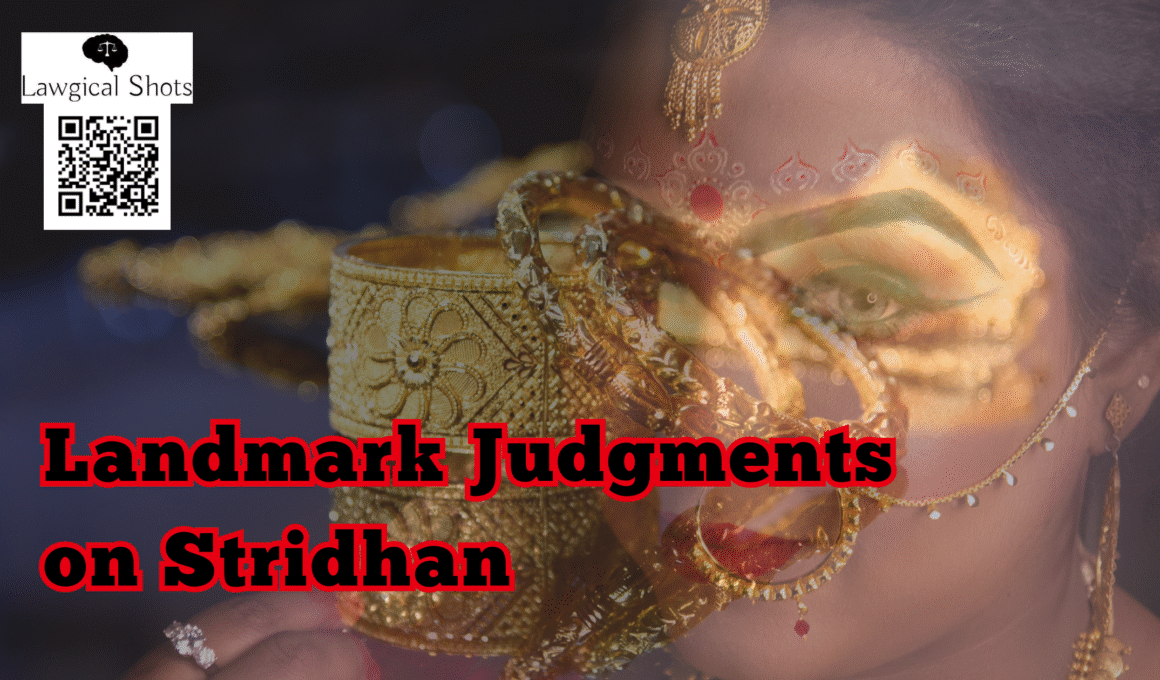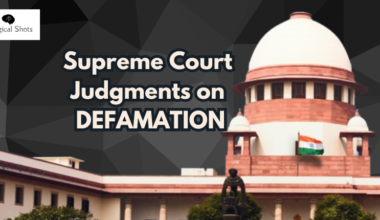In India, the cultural practice of giving gold and silver ornaments to the bride along with money at every other ritual is not new. The valuables become a Hindu female’s absolute property, as laid in specific laws. Not only the gifts given by the bride’s parents, but her friends, her husband’s family and friends are also covered in the definition of Streedhan. When the bride enters her matrimonial home, the said valuables are usually entrusted to the husband or mother-in-law. But when marriage falls, getting back her Stridhan becomes a battle for married Hindu women. The landmark Supreme Court Judgments clear the way for any legal uncertainty in this regard.
While it may sound easy that the wife has absolute right over her Stridhan, it takes a while to prove the same before the Court. Sometimes, it requires proving the specifics of ornaments, the other times, it’s about proving custody of Streedhan with the husband or in-laws. The landmark Stridhan case laws help strengthen a case and clarify the legal picture of a woman’s rights over her Stridhana.
Supreme Court Judgments on Stridhan
Mulakala Malleshwara Rao v. State of Telangana (2024 INSC 639)
The Stridhana case laws are usually a claim by wife against her husband and in-laws. However, this case was one of its kind wherein the complaint was made at the instance of a father against the former in-laws of his daughter for not returning gold ornaments given to her at the time of marriage. The daughter had not even authorised her father in the form of a Power of Attorney to proceed in Court for recovery of her Streedhan. Thus, the Court looked at the father’s right on his daughter’s Stridhan given by him. The Supreme Court judgment on Stridhan clarifies that a father has no right over a daughter’s Stridhan when she is alive and capable of making her own decisions.
Maya Gopinathan v. Anoop SB (2024 INSC 334)
In this landmark judgment on Stridhana, the Court affirmed with the Family Court’s view that the husband had no claim over the Stridhan of his wife. The husband even had no control over the Stridhan property. It was the absolute property of the wife, with all rights to dispose of the Stridhan at her own pleasure. The Supreme Court disapproved the contention to prove the mode and manner of acquiring Stridhan articles. It clarified that it’s not a criminal trial wherein chain of circumstances had to be conclusive without any missing link.
Bobbili Ramakrishna Raja Yadad v. State of Andhra Pradesh (2016)
The tragic case here pertains to the suspicious death of the wife soon after her marriage. Her father filed a complaint seeking recovery of dowry amount and other articles. The Court explained that “Giving of dowry and the traditional presents at or about the time of wedding does not in any way raise a presumption that such a property was thereby entrusted and put under the dominion of the parents-in-law of the bride or other close relations so as to attract ingredients of Section 6 of the Dowry Prohibition Act.” The Court clarified that stridhana articles are given to a bride to be sent along to her matrimonial house. The husband, his parents and sisters were residing separately. Thus, they were not duty bound to return the Streedhan to the wife.
Krishna Bhatacharjee v. Sarathi Choudhury (2015)
The case here is a landmark judgment for Stridhan because the Court scanned status of “aggrieved person” for DV case under Section 12. First, the husband succeeded judicial separation in a Family Court. Later, through an application under Section 12 of DV Act, the wife sought seizure of Stridhan articles from the possession of the husband. However, the Court acknowledged marriage but denied domestic relationship between the husband and wife after judicial separation. Thus, she could not be considered an aggrieved person to extend relief under DV Act.
The Supreme Court clarified that “Once the decree of divorce is passed, the status of the parties becomes different, but that is not so when there is a decree for judicial separation.” Speaking of the limitation period for recovery of Stridhan, the Court observed that Streedhan is a woman’s absolute property, the husband or his relatives only being custodians having no right over the same. Thus, while it was judicial separation and the ties were not severed by a decree of dissolution of marriage, depriving his wife of her Stridhan was a “continuing offence” for the purpose of limitation.
Rashmi Kumar v. Mahesh Kumar Bhada (1996)
With the claim of being driven out of the marital home along with her three children, the wife here claimed that all her Stridhan lay in husband’s custody. She did not get the chance to take back her gold-silver ornaments or cash given to her during her marriage, which was entrusted to her husband. When demanded, her husband flatly refused to return her Streedhan. The Court looked at the crucial question – whether the wife being driven out from matrimonial home without taking along her stridhana properties, amounts to entrustment with the husband leading to criminal breach of trust?
The Court looked at the ingredients of Section 406 of IPC. It concluded that “when the wife entrusts her stridhana property with the dominion over that property to her husband or any other member of the family and the husband or such other member of the family dishonestly misappropriates or converts to his own use that property or wilfully suffers any other person to do so, he commits criminal breach of trust.”
The Supreme Court judgment on Streedhan further holds importance for proving the entrustment. The Court here said that “It is always a question of fact in each case as to how property came to be entrusted to the husband or any other member of the family by the wife when she left the matrimonial home or was driven out therefrom. No absolute or fixed rule of universal application can be laid down in that behalf. It requires to be established by the complainant or the prosecution, depending upon the facts and circumstances of the case, as to how and in what manner the entrustment of the stridhana property or dominion over her stridhana came to be made to the husband or any other member of the family or the accused person, as the case may be.”
Pratibha rani v. Suraj Kumar (1985)
The Supreme Court case on Stridhan here is very interesting. The matter pertained to the initial question: Whether the dowry/stridhan given to a wife and her exclusive property becomes a joint property/partnership property by a fiction of being placed in the custody of her husband and her relations, the moment a married woman enters her matrimonial home. Looking into the details of jewellery, sarees, blouses, nighties, etc., the Court summed up that it could not be said that the articles could also be used by the husband. If demands for such articles were refused to be returned to the wife, it amounted to criminal breach of trust.
The Court looked at Manu’s enumeration of Stridhana. The Apex Court expressed that “It is, therefore, manifest that the position of stridhan of a Hindu married woman’s property during coverture is absolutely clear and unambiguous; she is the absolute owner of such property and can deal with it in any manner she likes – she may spend the whole of it or give it away at her own pleasure by gift or will without any reference to her husband. Ordinarily, the husband has no right or interest in it with the sole exception that in times of extreme distress, as in famine illness or the like, the husband can utilise it but he is morally bound to restore it or its value when he is able to do so. It may be further noted that this right is purely personal to the husband and the property so received by him in marriage cannot be proceeded against even in execution of a decree for debt.”








